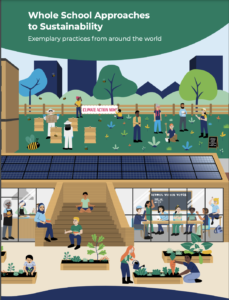Whole School Approach
The “Whole School Approach” concept extends beyond sustainability and has been applied in various educational contexts. It generally refers to a comprehensive strategy that involves all aspects of school life, including teaching and learning, community engagement, policy, and practice, to improve educational outcomes. The term has also been linked to educational reforms that aim to create a cohesive and supportive learning environment for all students. This includes engaging with parents, and local communities, and integrating various services and supports to address the diverse needs of students. While the specific origin of the term “Whole School Approach” outside the context of sustainability is not attributed to a single individual or paper, it has been a part of the educational discourse for several decades and continues to evolve as it is applied in different contexts around the world.
Whole School Approaches to Sustainability: Exemplary Practices from Around the World
Whole School Approach (WSA), as the starting point of the development of Green Learning Ecologies to facilitate students learning, refers to a holistic, systemic, co-creative, and reflexive effort by all stakeholders involved in education to meaningfully engage students and in general, the school community in complex sustainability challenges. Holistic highlights the attempt to explore and address sustainability issues from multiple perspectives in an integrated and relational way. Systemic refers to considering key aspects of the education system simultaneously (formal, non-formal, and informal education, curriculum, pedagogies and learning, professional development, school-community relationships, school practices, vision, and leadership). Co-creative refers to the inclusion of multiple voices and stakeholders in the development of the approach within a given context either at a school or a policy level. At last, reflexive refers to the need for continuous learning, monitoring, evaluation, and re-calibration in response to an ever-changing world (Sotiriou et, al. 2024).
For more information on the Whole School Approach please refer to the Inspiring Practices in the SYNAPSES Portal.
References:
Mathie, R. G. and Wals, A.E.J. (2022) Whole School Approaches to Sustainability: Exemplary Practices from around the world. Wageningen: Education & Learning Sciences/Wageningen University. 62 pages. https://doi.org/10.18174/566782.
1 Comment
Submit a Comment
You must be logged in to post a comment.



The concept of the Whole School Approach is, in my opinion, a transformative vision for education, especially when applied to sustainability. I appreciate how this model goes beyond just the curriculum content and embraces the entire school experience — from relationships between the school and community to daily practices and leadership. It’s an approach that recognizes the complexity of today’s challenges and the need to address them in an integrated and collaborative way.
The role of the teacher in this process is absolutely crucial. More than just knowledge transmitters, teachers become facilitators and co-creators of learning, connecting students with the real world and promoting critical thinking and social responsibility. They are often the link that bridges theory and practice, motivating students to actively engage and reflect on the impact of their actions on the environment and society.
Moreover, the reflective dimension of the model requires teachers to be in continuous development, adapting and innovating to respond to the challenges of a rapidly changing world. This dynamic and multifaceted role makes the teaching profession even more challenging but also extremely rewarding, as it enables the building of truly sustainable and resilient school communities.
In summary, I believe that the success of this approach depends greatly on the commitment and creativity of teachers, who are key agents in cultivating a school culture of sustainability and active citizenship.